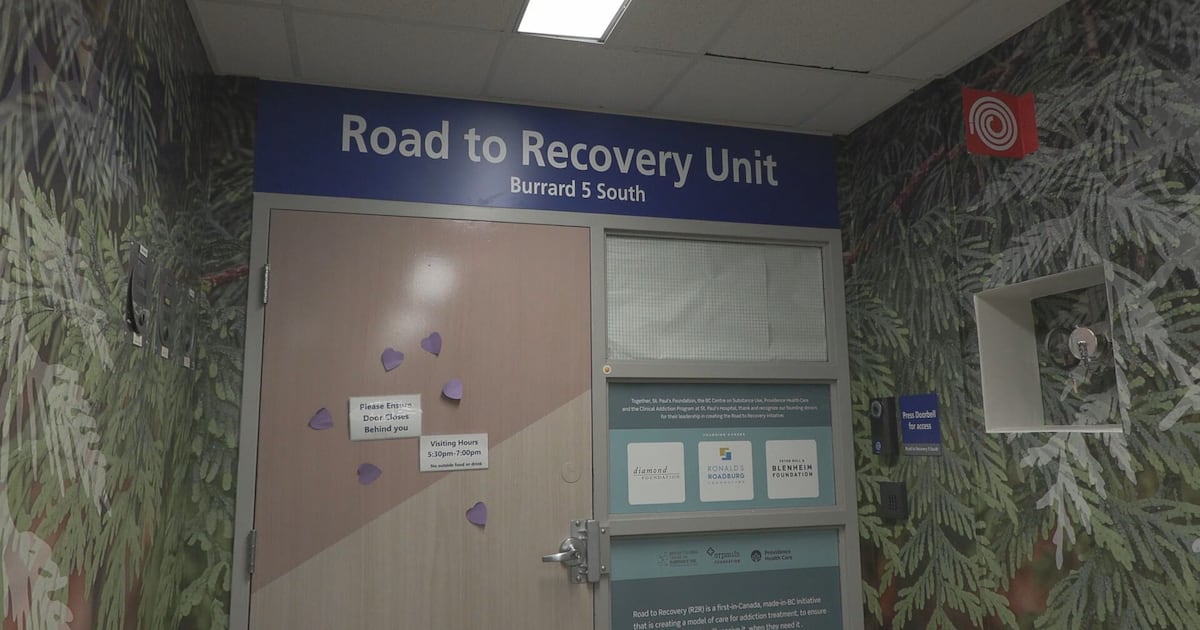Health
Vancouver’s Detox Wait Times Drop Following New Drug Treatment Model

A new approach to addiction treatment in British Columbia has significantly reduced wait times for detox beds, facilitating quicker access to care for individuals battling substance use disorders. The Road to Recovery (R2R) program, initiated at St. Paul’s Hospital two years ago, has transformed the treatment landscape in Vancouver Coastal Health communities. This innovative system, which consolidates access to various treatment options through a single phone number, is now being implemented throughout the province.
Dr. Shona Nolan, co-founder of the R2R program and an addiction physician, emphasized the previous challenges posed by a fragmented treatment system, making it difficult for patients and families to find the help they needed. “Through the creation of a single front door, it streamlines people to one single telephone number to call to access substance use services,” she explained. When individuals reach out for help, they are assessed by a nurse or doctor who determines their needs and assigns them to the next available detox bed within the health authority.
Patients presenting with severe withdrawal symptoms, which can include hallucinations and other complications, are prioritized at St. Paul’s Hospital. As a result, the wait for recovery beds has decreased from months to mere weeks, with some individuals even receiving detox services on the same day they seek help. Dr. Nolan expressed frustration over political narratives that claim treatment options are unavailable, noting that misinformation can deter patients from seeking the assistance they require. “It’s harmful to patients when they hear bits of information that is inaccurate or false and deters them from accessing services that may otherwise meet their needs,” she stated.
For those unable to access detox immediately, alternatives are available. Patients may be prescribed an opioid substitute such as methadone or Suboxone, and peer-led support programs are ready to assist newcomers.
Personal Experiences Highlight System Efficiency
The streamlined process has had a profound impact on individuals like Jamie Ramsey, who faced significant challenges due to alcohol use. After years of struggling with addiction, she found herself binge-drinking and visiting the emergency department for withdrawal symptoms. During her second visit, paramedics recommended the Rapid Access Addiction Care Clinic to connect her with the R2R intake process.
“At that point, I felt super overwhelmed and embarrassed,” Ramsey recounted. However, her experience with the R2R program was markedly different. She appreciated that after sharing her situation once, she did not need to repeat herself to each new team member. “All I had to do was show up and say, ‘I need help,’ and everything else that I needed to be done was guided for me,” she said. Now, Jamie is thriving in recovery and appreciates the support system that has emerged through the R2R initiative.
Ongoing Challenges in Addiction Treatment
Despite the improvements in detox accessibility, the government continues to face scrutiny over the pace of expanding treatment options for alcohol and illicit drug users. The NDP government has been criticized each time incidents of violence or street disorder make headlines. Experts warn that addiction treatment is complex and not universally effective. Dr. Mark Lysyshyn, deputy chief medical health officer for Vancouver Coastal Health, pointed out that even the most established treatments only work for about half of patients.
Additionally, while there are privately run detox facilities and treatment centres offering varied approaches, the lack of regulatory oversight raises concerns about their efficacy. Many of these programs charge substantial fees, leading to calls for investigation into the industry.
The R2R program operates on a voluntary basis, allowing participants to leave whenever they choose. Dr. Nolan emphasized the importance of providing care in a way that acknowledges the emotional and physical challenges of withdrawal. “We recognize that experiencing withdrawal for many different reasons can be an intense emotional, physical, spiritual journey,” she noted.
This article is part of a five-part series examining British Columbia’s evolving response to addiction and the factors contributing to the ongoing crisis. The series aims to shed light on the complexities of treatment and the innovative solutions being implemented to address these pressing public health issues.
-

 Science3 months ago
Science3 months agoToyoake City Proposes Daily Two-Hour Smartphone Use Limit
-

 Top Stories3 months ago
Top Stories3 months agoPedestrian Fatally Injured in Esquimalt Collision on August 14
-

 Health3 months ago
Health3 months agoB.C. Review Reveals Urgent Need for Rare-Disease Drug Reforms
-

 Technology3 months ago
Technology3 months agoDark Adventure Game “Bye Sweet Carole” Set for October Release
-

 World3 months ago
World3 months agoJimmy Lai’s Defense Challenges Charges Under National Security Law
-

 Lifestyle3 months ago
Lifestyle3 months agoVictoria’s Pop-Up Shop Shines Light on B.C.’s Wolf Cull
-

 Technology3 months ago
Technology3 months agoKonami Revives Iconic Metal Gear Solid Delta Ahead of Release
-

 Technology3 months ago
Technology3 months agoApple Expands Self-Service Repair Program to Canada
-

 Technology3 months ago
Technology3 months agoSnapmaker U1 Color 3D Printer Redefines Speed and Sustainability
-

 Technology3 months ago
Technology3 months agoAION Folding Knife: Redefining EDC Design with Premium Materials
-

 Business3 months ago
Business3 months agoGordon Murray Automotive Unveils S1 LM and Le Mans GTR at Monterey
-

 Technology3 months ago
Technology3 months agoSolve Today’s Wordle Challenge: Hints and Answer for August 19









